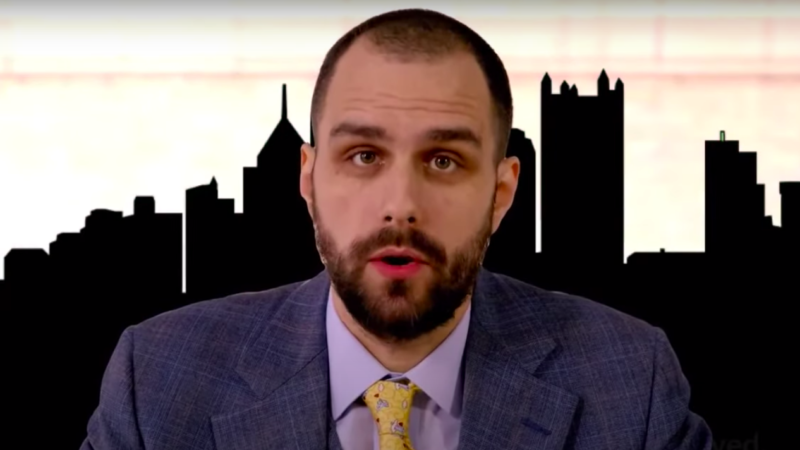Man With No Criminal History Gets 5-Year Sentence for Selling Weed
The federal mandatory minimum didn't leave many options.

Companies sold about $30.6 billion worth of legal marijuana last year, making cannabis one of the fastest growing industries in the United States. Marijuana arrests, as a consequence, are way down. None of that provides comfort, though, to a 40-year-old Pittsburgh man named Daniel Muessig, who faces five years in prison for selling weed. A former lawyer with no criminal history, Muessig pleaded guilty last year to federal charges of conspiring to distribute 100 kilograms or more of marijuana and possession with intent to distribute 100 kilograms or more of marijuana.
U.S. District Judge Arthur J. Schwab sentenced Muessig on Tuesday, March 8, citing "the seriousness of the offense" and the need to "promote respect for the law."
Muessig was swept up in a far-reaching federal investigation into trafficking of cocaine and heroin when agents discovered more than 400 pounds of marijuana during a raid on "stash house" in Squirrel Hill on May 24, 2019. (Muessig admits to dealing marijuana but says he has never sold or taken harder drugs.) He escaped from the raid on foot and lived in limbo for more than two years. Gradually, his fear of going to prison gave way to hope; he and his wife, Laura Boyarsky, began the process of adopting a child.
But everything changed when he was indicted last August and pleaded guilty in November. Federal law requires a minimum sentence of five years for his crimes. The mandatory minimum "removes any consideration of past history," says Morgan Fox, political director of the National Organization for the Reform of Marijuana Laws, known as NORML, which supports the legalization of weed.
Muessig's case is unusual, but hardly unique. In FY 2020, federal courts sentenced 1,118 people for marijuana trafficking, according to the U.S. Sentencing Commission. Some 62 percent were Hispanic and 18 percent were black.) "Federal prosecutors, generally, have not been prioritizing cannabis issues," Fox says. "But they have the ability to do so."
Last month, for example, Fayao "Paul" Rong, 51, was arrested and charged with trafficking large quantities of marijuana illegally grown in Oregon; if convicted, he faces a 10-year mandatory minimum sentence (due to the large quantities of marijuana involved). The vast majority of marijuana arrests (about 350,000 in 2020) were made at the state level, but most states allow judges discretion in sentencing.
To avoid the five-year minimum, Muessig could have provided evidence against others involved in the drug trafficking ring. He declined. "I'm not a snitch," he says. "It's against my moral code. No one is going to jail for marijuana on my watch if I can help it."
Muessig was raised in a middle-class home in Squirrel Hill, a tight-knit Jewish neighborhood in Pittsburgh. He first worked as a rapper, touring Europe and selling CDs and records. He then became a criminal defense lawyer, enjoying a few minutes of fame when he released a brash YouTube video featuring testimonials from men, who appeared to be his criminal pals, thanking him for getting them off the hook. "I may have a law degree, but I think like a criminal," Muessig says in the video. Slate called it "the best (or worst) lawyer commercial ever made."
When Muessig realized that the video might prejudice prosecutors and judges against him, he gave up on law and turned to what he knew: pot. Pennsylvania has not legalized marijuana for recreational use, but "people needed cannabis here," Muessig says. "I did it for money, yes. I also did it because people in our community deserved access before the government and monied interests decided it was suitable for them to get it."
President Joe Biden said last year that "no one should go to jail for the use of a drug," but he's done little to curb the war on drugs. Biden and Congress could end all federal marijuana prosecutions by removing the drug from Schedule I of the Controlled Substances Act, which is supposed to be reserved for dangerous drugs with no accepted medical use. Biden could additionally ask the Justice Department to halt marijuana prosecutions. He's also been urged by reformers to pardon federal prisoners who are now incarcerated for drug offenses. About two-thirds of Americans say they support marijuana legalization, according to Gallup.
Andrew DeAngelo, board chair of an advocacy group called The Last Prisoner Project and a supporter of Muessig, says, "Nobody should be locked up for weed. It's clearly wrong." DeAngelo and his brother Steve both served time for marijuana possession before they started the largest medical marijuana dispensary in Harborside, California. They've seen the business from every angle. Biden can't shake "the prohibitionist mindset," says Andrew. "We've just got to keep raising hell."
Muessig, for his part, is resigned to his fate. "I'll take my punishment like a man," he told the judge. His imprisonment will do little more than create a market opportunity for the next marijuana distributor in Pittsburgh.
